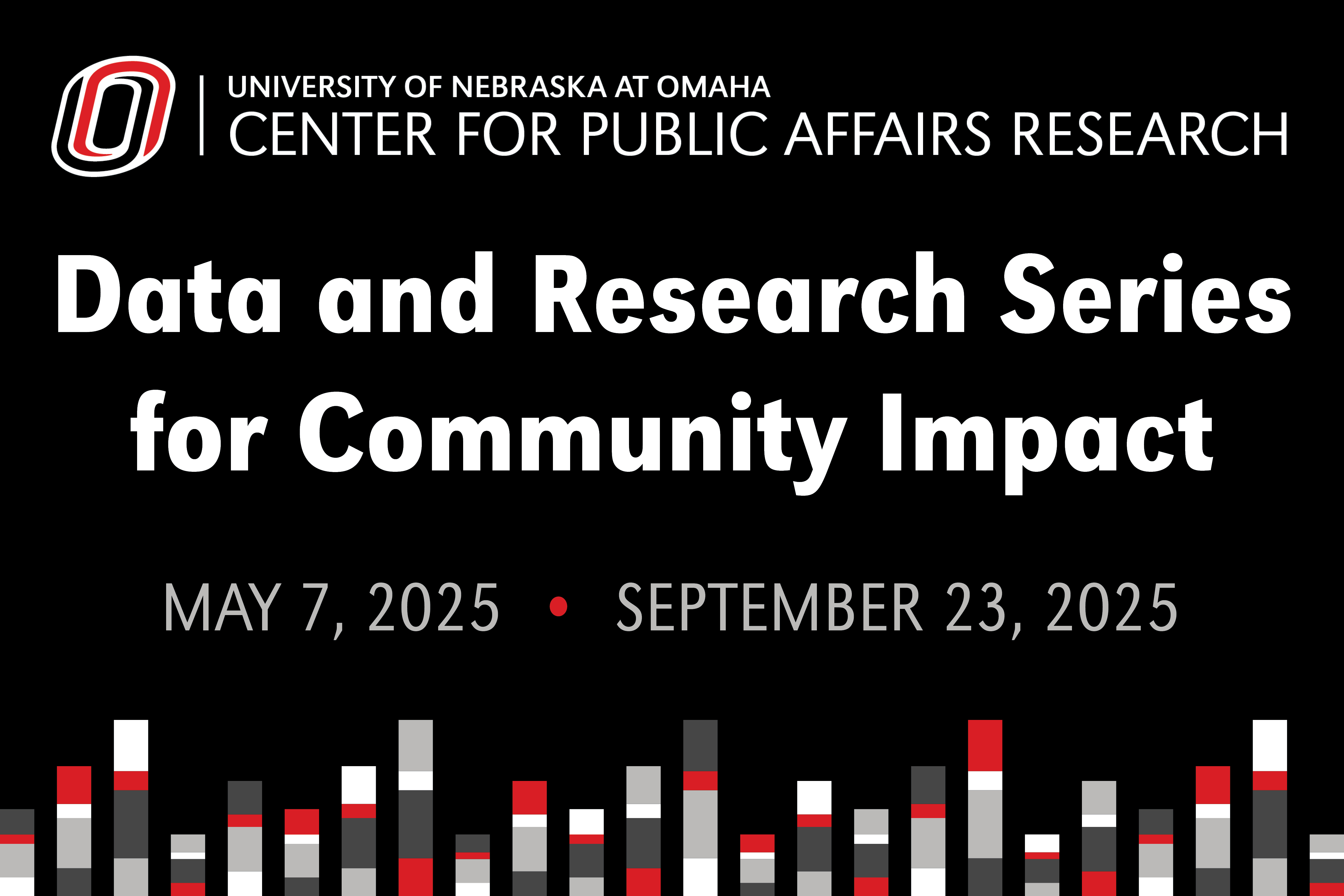
The 36th Annual CPAR Data and Research Series for Community Impact is back in 2025 and this year we've diving into two distinct themes. This professional development series is perfect for anyone looking to use data to drive change in our communities — whether you're a seasoned pro or just getting started.
Part One: Exploring Metro Data
Wednesday, May 7, 2025 | 9 A.M.-12 P.M. | In-person Only
Location will be the University of Nebraska at Omaha Dodge Campus and is limited to 90 attendees. (Exact location will be emailed to you after completing registration.)
Part One will explore trends in demographic data from the U.S. Census Bureau for Nebraska’s two largest metros – Omaha and Lincoln – and how community leaders in these places are using data to guide decision-making and drive community growth. This event provides an opportunity for professionals, researchers, and community leaders to enhance their understanding of Census data resources and how to apply these sources and others to policy, economic development, and community planning.
9-9:05 A.M. – Welcome
- Morgan Vogel, Ph.D., assistant director, University of Nebraska at Omaha Center for Public Affairs Research
9:05-10:15 A.M. – From State Leaders to National Contenders? Visualizing Growth in Nebraska’s Two Largest Metropolitan Areas | Omaha and Lincoln
This session will visualize population arcs and changes in Nebraska’s two largest metros — Omaha and Lincoln — using Census data to highlight how their growth compares to statewide trends and to similarly sized metros across the U.S. We’ll also examine key housing and workforce indicators to better understand how these places are positioned for future growth and competitiveness.
- Josie Schafer, Ph.D., director, University of Nebraska at Omaha Center for Public Affairs Research
10:15-10:30 A.M. – Break
10:30 A.M.-12 P.M. – Using Data to Drive Growth in Planning and Economic Development
Attendees will participate in two expert-led panel discussions focused on how data is shaping the future of Nebraska’s two largest metro areas. Panelists — featuring city planners, policymakers, and economic development leaders from Omaha and Lincoln — will share how they use data to guide decision-making, shape policy, and drive community growth. The Planning and Development Panel will explore data-driven approaches to urban planning, including transit, housing, and infrastructure. The Economic Development Panel will explore how data informs workforce and business support programming and regional strategies for economic vitality. Together, these discussions will tackle a central question: How are we using data to support and sustain long-term population growth and vitality in our metros?
- 10:30-11:15 A.M. – Planning and Development Panel
- Michael Helgerson, M.P.A., executive director, Metropolitan Area Planning Agency
- Morenike Atejioye, city planner, City of Omaha Long Range Planning
- Kurt Elder, AICP/GISP, senior planner, City of Lincoln Urban Development
- 11:15 A.M.-12 P.M. – Economic Development Panel
- Alec Gorynski, M.P.A., senior vice president of economic development, Greater Omaha Chamber
- Trevon Brooks, M.B.A., CEO, Omaha Innovation Connection Hub
- Luke Peltz, vice president of economic development, Lincoln Partnership for Economic Development
12 P.M. – Closing Remarks
Note: The University of Nebraska at Omaha will be taking photos/video at this event for use in advertising and other promotional materials, whether in print, electronic, or other media.
Part Two: Updates on Statewide Data
Tuesday, September 23, 2025 | 9 A.M.-12 P.M. | In-person and Virtual (Zoom Webinar)
Location will be the University of Nebraska at Omaha Dodge Campus and is limited to 90 attendees. (Exact location will be emailed to you after completing registration.)
Agenda will be announced at a later date.
Note: The University of Nebraska at Omaha will be taking photos/video at this event for use in advertising and other promotional materials, whether in print, electronic, or other media.
Registration
Part One Cost = $80 (includes snacks, coffee, and water)
Deadline to register is Tuesday, April 29.
Discount
If you have two or more people from your organization that want to attend, use the Discount Code datagroup to receive 25% off each registration.
Registration for Part Two will open at a later date.
Payment options include: Credit Card via PayPal, Check (for in-person registrations, checks will be due to UNO CPAR within two weeks of registration because of limited seats available), or University of Nebraska Cost Object (for University of Nebraska faculty, staff, and students only). IBT payment is not available.
Note: Registration is non-refundable because you will receive access to presentation materials.
Presenters
| Presenter Photo | Presenter Name, Title, Place of Work | Presenter Biography |
 |
Josie Gatti Schafer, Ph.D. Director University of Nebraska at Omaha Center for Public Affairs Research |
Schafer joined UNO’s College of Public Affairs and Community Service as the director of the Center for Public Affairs Research in 2018 because of their national reputation for public scholarship on public policy topics in their community, state, and region. She manages a stellar team with a current portfolio of projects totaling over $1 million per year. Her personal, project portfolio ranges with several smaller engaged research projects working collaboratively with a community partner as well as some high-profile research like CPAR's work with the Planning Committee of the Nebraska State Legislature. Recent grants and projects led by Schafer include research and analysis as part of the “6 Regions, One Nebraska” initiative; review of demographics, workforce, and housing in Omaha neighborhoods; collaboration with UNMC to analyze the status and future of the healthcare workforce; fellowship from the Philadelphia Federal Reserve Bank and Coalition of Urban and Metropolitan Institutions to study the economic impact of anchor institutions; and a grant from the Ewing Marion Kauffman Foundation to study inclusive entrepreneurship. |
 |
Morgan Vogel, Ph.D. Assistant Director University of Nebraska at Omaha Center for Public Affairs Research |
Vogel believes wholeheartedly in CPAR's mission to produce and disseminate high-quality public scholarship that impacts the lives of Nebraskans. She joined the CPAR team in January 2021 as a research associate because she wanted to bridge her academic research skills and passion for community engagement. Vogel was promoted to assistant director in January 2025. She works closely with CPAR’s director to develop and conduct research projects for a variety of community partners. She also enjoys working with a stellar group of graduate student research assistants in CPAR and encouraging their interests in applied research. |
 |
Michael Helgerson, M.P.A. Executive Director Metropolitan Area Planning Agency |
Helgerson is executive director at the Metropolitan Area Planning Agency (MAPA) — the Metropolitan Planning Organization (MPO) for the Omaha-Council Bluffs region. As executive director, Helgerson oversees agency operations and MAPA's roles as Council of Governments (COG), Economic Development District (EDD), and MPO. He led the development of MAPA’s 2050 Long Range Transportation Plan, a regional effort undertaken in partnership with the Greater Omaha Chamber’s ConnectGO initiative. He is a member of the Board of Directors for the Omaha Inland Port Authority and the Cass County Nebraska Economic Development Corporation. Helgerson received a Bachelor of Science in Community and Regional Planning from Iowa State University in Ames, Iowa, and a Master of Public Administration from the University of Nebraska at Omaha. He lives in Omaha with his wife, Lauren, and four children. |
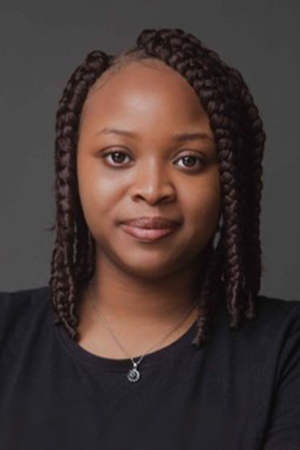 |
Morenike Atejioye City Planner City of Omaha Long Range Planning |
Atejioye is a city planner with the City of Omaha. She received a Master's degree in Community and Regional Planning with an emphasis in Business Analytics from Iowa State University. She has worked on a range of projects, including comprehensive planning, land use analysis, transportation strategies, and public engagement initiatives, combining data-driven insights with community input to shape plans that reflect the voices and aspirations of diverse populations. |
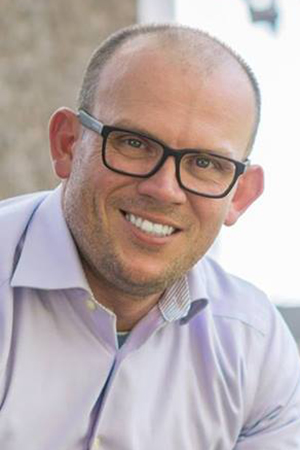 |
Kurt Elder, AICP/GISP Senior Planner City of Lincoln Urban Development |
Elder is a senior planner and data analyst with the City of Lincoln's Urban Development Department. He has held a GISP and AICP certification for over a decade. In his private practice Information Art, Kurt is passionate about neighborhood development and engaging communities through technology. For 14 years he has cohosted a weekly radio program titled "Our Street" where he covers neighborhood issues, policies, and politics. You are invited to learn more at KZUM.org. His approach brings diverse perspectives to initiatives, leveraging extensive experience to meet resident and client needs. He has a diverse academic background, including studies in planning, leadership development, public administration, social geography, agriculture systems, and spatial statistics. |
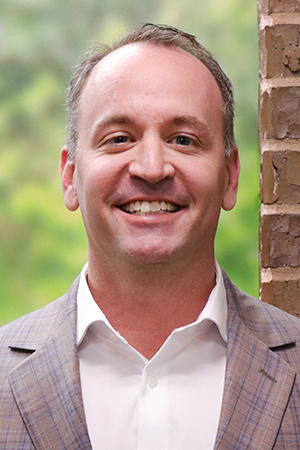 |
Alec Gorynski, M.P.A. Senior Vice President of Economic Development Greater Omaha Chamber |
Gorynski is a community and economic development leader with 20 years of leadership and practitioner experience across private, nonprofit, and government sectors. He serves as the senior vice president of economic development for the Greater Omaha Chamber and Economic Development Partnership where he leads the economic growth strategy for the Greater Omaha region. Prior leadership includes president and CEO of Lincoln Community Foundation, vice president of Community Development for FNBO and president of the FNBO Community Development Corporation, vice president for Community Development at Bank of the West, deputy grant administrator for the City of Omaha Office of the Mayor. Gorynski’s career also includes extensive professional community service where he co-founded three community development financial institutions, has been appointed by the Governor to two State of Nebraska boards, and has held numerous board, officer, and committee roles with over a dozen foundations and community development organizations. He holds a Master of Public Administration from the University of Nebraska at Omaha, and Bachelor of Science degree from Peru State College. He and his wife, Laura, have three children: Jamie (12), Ben (9), and Claire-Bear (8). |
 |
Trevon Brooks, M.B.A. CEO Omaha Innovation Connection Hub |
Brooks is an U.S. Air Force veteran who moved to Omaha and quickly integrated into the community, bringing a deep passion for economic development and relationship building. With a Master’s in Business Administration from Midland University and a Master’s in Strategic Finance from Bellevue University, he combines academic knowledge with practical experience. Brooks began his career at the Nebraska Department of Economic Development by focusing on North Omaha, a community that had experienced significant disinvestment. He excelled in identifying business needs and forming crucial relationships with local leaders. As Chief Strategy Officer, he oversaw the distribution of $330 to $450 million in COVID relief funds, ensuring that minority communities, disproportionately impacted by the pandemic, receive sustainable support. Known for his charisma and intentionality, Brooks became the CEO of the Omaha Innovation Connection Hub focusing on lowering the barrier of entry for entrepreneurship and innovation in Nebraska. He is dedicated to fostering business investment and job creation throughout Nebraska. He emphasizes the importance of storytelling in promoting Nebraska’s successes, advocating for shared narratives about the state's legislative achievements, corporate growth, and economic stability. His approach to economic development is rooted in humility and a commitment to leveraging relationships to drive positive change. |
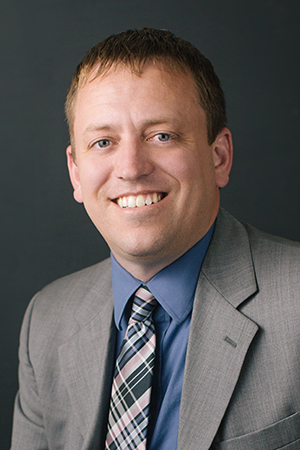 |
Luke Peltz Vice President of Economic Development Lincoln Partnership for Economic Development |
Peltz has been a driving force in Lincoln’s economic growth since joining the Lincoln Partnership for Economic Development (LPED) in 2013. He began his tenure with LPED as director of business development before stepping into the role of vice president in 2020. Beyond his work with LPED, Peltz serves on the Nebraska Economic Developers Association board of directors, the Mayor’s Parking Advisory Council, the Downtown Lincoln Association board of directors, and the Community Development Resources board of directors. He holds a degree in Business Management from the University of Nebraska-Lincoln. |
Questions? Contact unocpar@unomaha.edu or 402.554.7533.
UNO is an AA/EEO/ADA institution. For Title IX concerns, please contact the Title IX Coordinator (phone:402.554.2120). For ADA/504 accommodations or assistance, please call/contact the ADA/504 Coordinator (phone 402.554.2463) or the Accessibility Services Center (phone: 402.554.2872).
